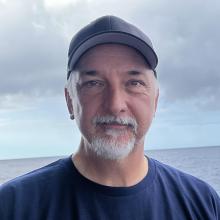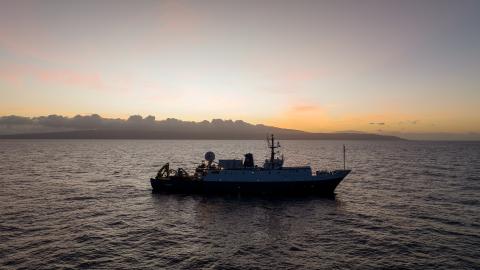
David Pereksta
Tell us about your work/research. What kinds of things do you do?
I am an Avian Biologist for the Bureau of Ocean Energy Management (BOEM) in the Pacific Region Office. BOEM is the federal agency responsible for managing energy and mineral resources on the U.S. Outer Continental Shelf. My subject matter expertise is avian species, which includes birds and bats. The focus of my work is developing environmental studies to investigate a variety of avian-related topics including the status and distribution of species, interactions with and vulnerability to activities offshore, and advancing technology to improve data collection. I also assess and analyze effects to birds and bats from offshore energy activities. All of these elements of my job require extensive collaboration with other scientists, agency personnel, and avian stakeholders.
What sparked your initial interest in your career?
I started birdwatching at an early age and after visiting the Cornell Lab of Ornithology when I was in second grade, I saw that there were career possibilities with birds. Growing up in the 1970s and 1980s, I witnessed the movement for conserving and recovering threatened and endangered species, and I became fascinated with the efforts to bring species back from the brink of extinction. When I saw there were career opportunities in wildlife conservation, I pursued that and have never looked back. After 36 years of working on complex conservation issues with a variety of imperiled species, I still get excited about collaborating to find positive paths forward to provide viable futures for birds and other wildlife.
Who influenced you or encouraged you the most?
My family has always been supportive of my obsession with birds and encouraged my career path although it may have bewildered them at times. My two major professors at Rutgers both inspired me in different ways to define a career path that I have stayed on to this day.
What element of your work/study do you think is the most fascinating?
Seabirds lead incredibly complex lives that we are still making significant discoveries about. Many have limited breeding ranges on islands and disperse around the world’s oceans during their nonbreeding season. Unlocking the mysteries of their lives to further our understanding of their temporal and spatial distribution at sea, and how that makes them susceptible to impacts from energy-related activities, is an exciting challenge to address. Advances in technology are leading to new discoveries that were not possible with the limitations of previous methods. Tracking of individuals with satellite, GPS, and other radio tags are leading to incredible discoveries of where seabirds are ranging.
How did you get involved with the Ocean Exploration Trust?
BOEM provided support for this expedition and gave some of its scientists opportunities to participate. I jumped at the chance to collect bird observations in this little surveyed area of the Pacific.
What other jobs led you to your current career?
My federal career started with the US Forest Service in the early 1990s where I was monitoring Spotted Owls and other late seral stage forest species in the southern Sierra Nevada for 3 years. I them migrated to the US Fish and Wildlife Service where I worked on endangered species issues along the central coast of California for 16 years.
What are your degrees and certifications?
Bachelor of Science in Natural Resource Management and Applied Ecology – Rutgers University 1990
What are your hobbies?
Birdwatching and bird photography are my primary hobbies because when I am not advancing the state of science and conservation of birds, I am obsessively out watching them. This includes traveling around the world in the pursuit of experiencing different and exciting birds. When it is too dark to look at birds, I try to maintain some level of skill as a musician and an artist. I also love seeing live music and have seen 100s of concerts since my first show in 1983.
What advice would you give someone who wants to have a career like yours?
I believe that each individual has their unique skills and talents and should do their best to follow where those take them. It is easy to get caught up in trying to be like your peers, but following your unique path in life will guide you to where you can be your best. While you may want to be like others, resist those temptations and do what you do best and make that shine.
Expeditions
David participated in the following Ocean Exploration Trust expeditions:

